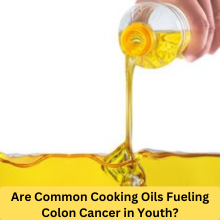
Recent research has sparked concern about the possible link between common cooking oils and a rise in colon cancer, particularly among younger people. While colon cancer was once primarily considered an issue for older individuals, an alarming increase in diagnoses among younger populations has caught the attention of health professionals. A recent government-led study in the United States highlights the potential role of cooking oils, specifically seed oils, in this troubling trend. These oils—found in everyday cooking products like sunflower, canola, grapeseed, and corn oils—may be playing a larger role in the development of colon cancer than previously thought.
The Link Between Seed Oils and Colon Cancer
Seed oils, derived from plants like sunflower, canola, corn, and grapeseed, have become staples in Western diets. They are commonly found in processed foods, baked goods, salad dressings, and used for frying in households and restaurants. While these oils have long been promoted as healthier alternatives to saturated fats, new research suggests they may contribute to a surge in colon cancer cases.
The groundbreaking study, published in the Gut journal, found that more than 80 individuals with colon cancer, aged between 30 and 85, showed increased levels of bioactive lipids in their tumors. These lipids are produced when the body metabolizes seed oils, and their presence was significantly higher in individuals who consumed large amounts of these oils. The study presents a troubling association between the consumption of seed oils and the development of colon cancer, pointing to bioactive lipids as a potential factor in tumor growth.
How Seed Oils Contribute to Colon Cancer Development
Chronic inflammation is a known risk factor for cancer. When the body experiences persistent inflammation, it can damage cells and promote tumor growth. Seed oils are rich in omega-6 fatty acids, which, when consumed in excess, can trigger this chronic inflammation. This is particularly concerning because the typical Western diet is already high in omega-6 fats and low in anti-inflammatory omega-3 fatty acids.
When the body metabolizes these omega-6 fatty acids, it produces bioactive lipids, which are molecules that can interfere with the body’s natural healing processes. Instead of promoting healing and tissue repair, bioactive lipids inhibit these functions, potentially leading to the development and growth of tumors in the colon.
Seed Oils and Their Impact on Western Diets
The use of seed oils in the Western diet has become ubiquitous in recent decades. These oils are favored for their low cost, high smoke point, and long shelf life, making them an attractive option for manufacturers and consumers alike. Seed oils are heavily used in ultra-processed foods, which are often high in unhealthy fats and sugars. These foods are a major component of the typical Western diet, which is known for being high in calories, low in nutritional value, and rich in inflammation-triggering ingredients.
The prevalence of seed oils in these foods means that many people consume them in large quantities without realizing the potential health risks. This shift in dietary patterns, combined with a sedentary lifestyle, has created an environment where chronic inflammation is becoming more common in the body, setting the stage for various diseases, including colon cancer.
Bioactive Lipids and Tumor Growth
Bioactive lipids are a crucial aspect of the new findings linking seed oils to colon cancer. These lipid molecules are formed when the body metabolizes omega-6 fatty acids from seed oils. Unlike the fats found in healthier oils—such as olive oil and avocado oil—bioactive lipids do not support the body’s healing processes. Instead, they promote inflammation and contribute to the growth and spread of tumors.
Research shows that tumors in individuals who consume large amounts of seed oils contain elevated levels of these bioactive lipids. This suggests that these molecules may play a direct role in facilitating cancer development. When compared to tumors from people who consume healthier fats like omega-3 fatty acids, tumors associated with high seed oil consumption show more pronounced inflammation and less effective healing.
Also read: Record Dengue Outbreak in the Americas – Are You at Risk?
Dr. Timothy Yeatman’s Insights on Diet and Colon Cancer
Dr. Timothy Yeatman, a renowned physician-scientist, is among the experts calling attention to the role of diet in cancer development. According to Dr. Yeatman, the recent findings underscore the need for a comprehensive reevaluation of the Western diet. In particular, he highlights the detrimental effects of added sugars, trans fats, and seed oils—ingredients that are abundant in processed foods.
Dr. Yeatman argues that cancer should be viewed as a “chronic wound” that does not heal. Chronic inflammation, driven by an unhealthy diet, impairs the body’s ability to repair itself, thereby creating an environment conducive to cancer growth. The more we consume ultra-processed foods laden with seed oils, the more we suppress our immune system and hinder our body’s natural defenses against cancer.
Can Seed Oils Alone Cause Colon Cancer?
While the study provides strong evidence of a link between seed oils and colon cancer, it’s important to note that cancer is a complex disease with multiple contributing factors. Seed oils alone are unlikely to be the sole cause of colon cancer. Other lifestyle factors, such as poor diet, lack of exercise, and genetic predisposition, also play significant roles in cancer development.
However, the study makes a compelling case that excessive consumption of seed oils, combined with a diet high in processed foods, could significantly increase the risk of colon cancer. While more research is needed to establish a direct causal link, the evidence thus far suggests that reducing seed oil intake could be a step toward lowering cancer risk.
Healthy Alternatives to Seed Oils
Fortunately, there are healthier alternatives to seed oils that can help reduce inflammation and support overall health. Oils rich in omega-3 fatty acids, such as olive oil and avocado oil, have been shown to have anti-inflammatory properties that may help reduce the risk of chronic diseases, including cancer. These oils not only provide essential nutrients but also promote better cellular health and immune function.
Incorporating these healthier fats into your diet is a simple yet effective way to counter the potential negative effects of seed oils. For instance, using olive oil for salad dressings or cooking with avocado oil can provide your body with the necessary nutrients it needs to combat inflammation and promote healing.
Omega-3 Fatty Acids and Cancer Prevention
Omega-3 fatty acids, found in foods like fatty fish, flaxseeds, and walnuts, are known for their anti-inflammatory properties. These healthy fats can help balance the excessive omega-6 fatty acids found in seed oils and reduce inflammation in the body. Research has shown that omega-3s may even play a role in preventing certain types of cancer, including colon cancer, by inhibiting tumor growth and promoting cell apoptosis (programmed cell death).
By replacing seed oils with omega-3-rich alternatives, individuals may reduce their risk of colon cancer and other inflammatory diseases. The key is to create a balanced ratio of omega-6 to omega-3 fatty acids, as this balance is crucial for maintaining optimal health.
Current Medical Opinions on Seed Oils and Cancer Risk
There is still some debate within the medical community regarding the exact role of seed oils in cancer development. While the recent study highlights a potential link, many health institutions, including the American Cancer Society and the National Institutes of Health, have clarified that moderate consumption of seed oils, as part of a balanced diet, has not been definitively shown to cause cancer.
However, experts agree that more research is needed to fully understand the long-term effects of seed oils on human health. Until then, it is prudent for individuals to be mindful of their overall diet and lifestyle, focusing on a well-rounded, nutrient-dense diet to reduce cancer risk.
The Role of Lifestyle and Diet in Cancer Prevention
Diet is just one factor in the complex web of cancer prevention, but it plays a critical role. In addition to reducing seed oil consumption, experts recommend focusing on a diet rich in fruits, vegetables, whole grains, and lean proteins. Regular physical activity, maintaining a healthy weight, and limiting alcohol and tobacco use are also essential components of cancer prevention.
By making these lifestyle changes, individuals can reduce their risk of colon cancer and improve their overall health. While no single factor guarantees cancer prevention, adopting a holistic approach to health can significantly lower the risk of developing many chronic diseases.
Also read: Tonight’s ‘SNL’ Hosts Paul Mescal: Time, Guest & How to Watch
Conclusion
The recent study linking seed oils to colon cancer highlights the importance of understanding the impact of our diets on long-term health. While the evidence is still emerging, the connection between chronic inflammation, bioactive lipids, and tumor growth is clear. As we continue to unravel the complexities of cancer development, it’s essential to consider the foods we consume and their potential effects on our bodies.
By replacing harmful seed oils with healthier fats and focusing on an anti-inflammatory diet, we can take proactive steps toward reducing our risk of colon cancer and improving overall health. As the research evolves, it’s crucial to stay informed and make choices that support a healthier future.
FAQs
What are bioactive lipids, and how do they relate to colon cancer?
Bioactive lipids are oily molecules produced when the body metabolizes omega-6 fatty acids from seed oils. They have been found to promote inflammation and hinder the body’s natural healing processes, potentially contributing to tumor growth.
Are seed oils the primary cause of colon cancer?
No, seed oils alone are not the sole cause of colon cancer. Other factors like genetics, lifestyle, and overall diet also play a role. However, excessive consumption of seed oils may increase the risk of developing cancer.
What are some healthier alternatives to seed oils?
Oils rich in omega-3 fatty acids, such as olive oil, avocado oil, and flaxseed oil, are healthier alternatives to seed oils. These oils help reduce inflammation and support overall health.
How can I reduce my intake of seed oils?
To reduce seed oil consumption, choose whole foods, cook with healthier oils, and limit processed foods that contain seed oils. Opt for home-cooked meals using fresh ingredients whenever possible.
Can omega-3 fatty acids help prevent colon cancer?
Yes, omega-3 fatty acids have anti-inflammatory properties that may help reduce the risk of colon cancer by promoting cell health and inhibiting tumor growth. Incorporating omega-3-rich foods into your diet can be beneficial for overall health.

